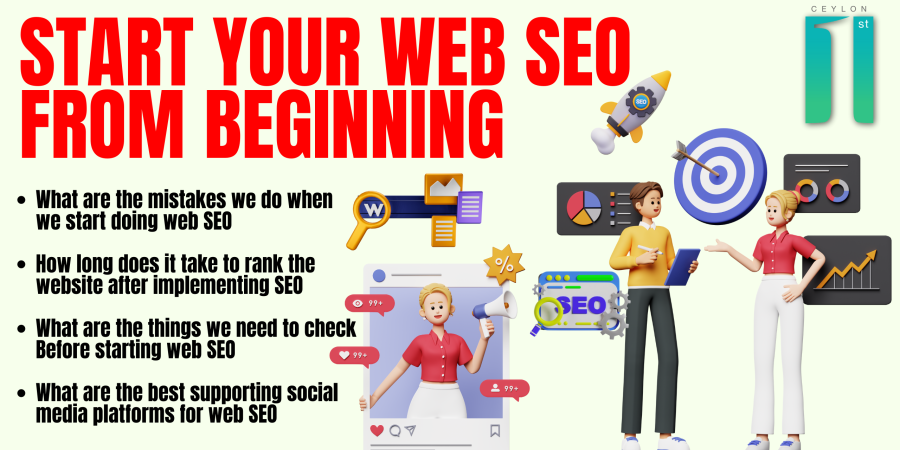Starting your web SEO (Search Engine Optimization) involves several steps to improve your website’s visibility and rankings on search engine results pages.
Here’s a beginner’s guide to help you get started:
- Keyword Research: Identify relevant keywords and phrases that users would search for when looking for content related to your website. Use keyword research tools like Google Keyword Planner, SEMrush, or Ahrefs to find popular and relevant keywords.
- On-Page Optimisation:
- Title Tag: Create unique, descriptive, and keyword-rich title tags for each web page. Keep it within 60 characters to ensure it displays properly in search results.
- Meta Description: Write compelling meta descriptions that summarize the page’s content and include relevant keywords. Limit it to 160 characters to ensure it appears fully in search results.
- URL Structure: Use clean and concise URLs that include relevant keywords and describe the page’s content.
- Heading Tags: Organize your content using heading tags (H1, H2, H3, etc.) and include keywords where appropriate.
- Content Optimisation: Create high-quality, informative, and engaging content that incorporates your target keywords naturally. Avoid keyword stuffing, as it can negatively impact your rankings.
- Image Optimisation: Optimise images by using descriptive filenames, alt tags, and compressing them to improve page loading speed.
- Technical SEO:
- Site Speed: Ensure your website loads quickly on both desktop and mobile devices. Use tools like Google PageSpeed Insights to identify and fix speed-related issues.
- Mobile-Friendliness: Make your website responsive and mobile-friendly to provide a good user experience. Google prioritizes mobile-friendly websites in search rankings.
- XML Sitemap: Create an XML sitemap that lists all your web pages to help search engines crawl and index your site effectively.
- Robots.txt: Use a robots.txt file to guide search engine bots on how to crawl and index your website’s pages.
- SSL Certificate: Secure your website with an SSL certificate to provide a secure browsing experience. It also boosts your rankings as Google favors HTTPS-enabled websites.
- Off-Page Optimisation:
- Link Building: Acquire high-quality backlinks from authoritative and relevant websites. Focus on natural link building through content promotion, guest posting, and relationship building with industry influencers.
- Social Media: Build a presence on social media platforms to increase brand awareness, engage with your audience, and attract potential backlinks.
- User Experience:
- Navigation: Ensure your website has a clear and intuitive navigation structure, making it easy for users and search engines to find content.
- Mobile Optimisation: Optimise your website for mobile devices, ensuring it is easy to navigate, loads quickly, and has a responsive design.
- Engaging Content: Create valuable and shareable content that encourages users to stay longer on your website, reducing bounce rates.
- Monitoring and Analysis:
- Use tools like Google Analytics and Google Search Console to track your website’s performance, monitor keyword rankings, analyze user behavior, and identify areas for improvement.
- Regularly review and refine your SEO strategy based on data and insights from these tools.
Remember, SEO is an ongoing process, and it takes time to see results. Stay up-to-date with the latest SEO trends and algorithm changes, and adapt your strategies accordingly.
What are the mistakes we do when we start doing web SEO
When starting web SEO, it’s important to be aware of common mistakes that can hinder your progress.
Here are some mistakes to avoid:
- Keyword Stuffing: Stuffing your content with excessive keywords in an unnatural manner can negatively impact your website’s rankings. Focus on creating high-quality, informative content that uses keywords naturally.
- Neglecting User Experience: Prioritising search engine algorithms over user experience can lead to poor engagement metrics and high bounce rates. Ensure your website is visually appealing, easy to navigate, and provides valuable content to visitors.
- Ignoring Mobile Optimisation: With the increasing number of mobile users, neglecting mobile optimization can harm your search rankings. Make sure your website is responsive, loads quickly on mobile devices, and provides a seamless user experience.
- Overlooking On-Page Optimisation: On-page optimisation elements, such as title tags, meta descriptions, and heading tags, are crucial for SEO. Neglecting to optimize these elements can impact your website’s visibility in search results.
- Neglecting Technical SEO: Technical aspects like site speed, XML sitemaps, and SSL certificates are important for search engines to crawl and index your website effectively. Ignoring technical SEO can result in poor rankings and indexing issues.
- Lack of Quality Content: Poor-quality content that lacks value, relevance, or originality can harm your SEO efforts. Focus on creating high-quality, engaging content that aligns with user intent and provides valuable information.
- Ignoring Link Building: Building a strong backlink profile is essential for SEO success. Neglecting link building or engaging in manipulative tactics can limit your website’s authority and visibility.
- Not Monitoring Performance: Regularly monitoring your website’s performance and tracking key metrics is crucial. Without proper monitoring, you may miss out on identifying issues, optimizing strategies, and capitalizing on opportunities.
- Expecting Immediate Results: SEO is a long-term strategy that requires patience and consistent effort. Expecting instant results can lead to frustration and abandoning your SEO efforts prematurely. Set realistic goals and maintain a long-term perspective.
- Failing to Adapt to Algorithm Changes: Search engine algorithms frequently change, and failing to adapt your SEO strategies accordingly can negatively impact your rankings. Stay updated on industry trends, algorithm updates, and best practices to maintain your website’s visibility.
By avoiding these common mistakes, you can establish a solid foundation for your web SEO efforts and increase your chances of achieving long-term success.
How long does it take to rank the website after implementing SEO
The time it takes to rank a website after implementing SEO can vary significantly and depends on several factors.
Here are some factors that can influence the timeline:
- Competition: The level of competition for your target keywords and industry can impact how long it takes to rank. If you’re targeting highly competitive keywords, it may take longer to achieve significant rankings compared to less competitive ones.
- Website Age and Authority: New websites or domains with limited history may take longer to gain trust and authority in the eyes of search engines. Older, established websites with a strong backlink profile and reputation may see faster results.
- Content Quality and Relevance: High-quality, relevant content that aligns with user intent can attract organic traffic and improve search rankings more quickly. If your content is well-optimized and offers unique value, it can help expedite the ranking process.
- Technical Optimisation: Ensuring your website is technically optimized for search engines, including factors like site speed, mobile-friendliness, and proper indexing, can positively impact rankings. Fixing technical issues can lead to faster improvements.
- Backlink Profile: Building a strong and authoritative backlink profile takes time. The quality and quantity of backlinks to your website can influence how quickly search engines recognize and reward your site with improved rankings.
- Frequency of Updates: Regularly updating and adding fresh content to your website can signal to search engines that your site is active and relevant. Consistent updates can help search engines crawl and index your site more frequently, potentially resulting in faster rankings.
- Algorithm Updates: Search engine algorithms undergo regular updates, and these changes can impact your rankings. If an algorithm update occurs shortly after implementing SEO efforts, it may take some time to assess the impact and make necessary adjustments.
Overall, SEO is a continuous process, and it typically takes time to see significant improvements in search rankings. It can take several weeks to months to start noticing positive results, and achieving top rankings for competitive keywords can often take even longer. It’s important to remain patient, consistently implement SEO best practices, monitor progress, and make adjustments as needed to improve your website’s rankings over time.
What are the things we need check before we start web SEO
Before starting web SEO, it’s important to conduct a thorough assessment of your website and its current state.
Here are some key things you should check:
- Website Structure and Navigation: Evaluate the structure and navigation of your website to ensure it is user-friendly and search engine-friendly. Check for clear and logical navigation, easy access to important pages, and a well-organized hierarchy.
- Indexing Status: Determine if your website is indexed by search engines. Perform a site search on Google by entering “site:yourwebsite.com” to see if your web pages appear in search results. If not, you may have indexing issues that need to be addressed.
- Site Speed: Check the loading speed of your website using tools like Google PageSpeed Insights or GTmetrix. Optimize your site’s performance by compressing images, minifying CSS and JavaScript files, and leveraging caching techniques.
- Mobile-Friendliness: Confirm whether your website is mobile-friendly, as mobile optimization is crucial for search engine rankings. Utilize Google’s Mobile-Friendly Test tool to evaluate how well your site performs on mobile devices.
- Content Quality and Relevance: Assess the quality, relevance, and uniqueness of your website’s content. Ensure that your content provides value to users, is well-written, and addresses their needs and interests. Identify any duplicate content issues that may exist.
- Keyword Research: Conduct comprehensive keyword research to identify relevant keywords and phrases that your target audience is using. Look for keywords with sufficient search volume and moderate competition. This will help you optimize your content and target the right audience.
- Competitor Analysis: Analyze your competitors’ websites to gain insights into their SEO strategies and performance. Identify their target keywords, backlink profiles, and content strategies to refine your own approach.
- Backlink Profile: Evaluate your existing backlink profile to determine the quality and quantity of backlinks pointing to your website. Use tools like Ahrefs or Moz to assess the domain authority of linking websites and identify any toxic or low-quality links that may need to be disavowed.
- Social Media Presence: Review your social media presence and determine if your website is properly integrated with your social media profiles. Ensure that your social media accounts are active and engaging to drive traffic and improve your brand’s online visibility.
- Analytics and Tracking: Set up website analytics using tools like Google Analytics. This will enable you to track important metrics such as organic traffic, bounce rates, conversions, and user behavior. Make sure you have proper tracking codes installed on your website.
By thoroughly checking these aspects before starting web SEO, you’ll have a better understanding of your website’s strengths, weaknesses, and areas for improvement. This will help you develop a more effective SEO strategy and optimize your website for better search engine rankings.
What are the best supporting social media platforms for web SEO
Several social media platforms can provide support for SEO efforts. While social media signals themselves may not directly impact search engine rankings, they can contribute to SEO indirectly by driving traffic, increasing brand visibility, and attracting backlinks.
Here are some of the best social media platforms for SEO support:
- Facebook: With its massive user base, Facebook offers a great opportunity to engage with your audience, promote your content, and drive traffic to your website. Sharing your blog posts, videos, and other valuable content on Facebook can generate social signals and potentially attract backlinks from interested users.
- Twitter: Twitter’s fast-paced nature makes it ideal for real-time updates, news sharing, and promoting time-sensitive content. Sharing your website content on Twitter can help increase its visibility, potentially leading to more traffic and social sharing.
- LinkedIn: Particularly effective for B2B businesses and professional networking, LinkedIn provides a platform to showcase expertise, share industry insights, and connect with industry influencers. Publishing articles on LinkedIn’s publishing platform can help establish thought leadership and attract relevant traffic to your website.
- Pinterest: Pinterest is a visual discovery platform that can be advantageous for businesses with highly visual content, such as fashion, home decor, food, and lifestyle. By optimizing your images for Pinterest and linking them back to your website, you can drive referral traffic and potentially gain backlinks.
- YouTube: As the second-largest search engine (after Google), YouTube offers significant SEO potential. Creating informative and engaging video content relevant to your niche can help attract views, subscribers, and traffic to your website. Embedding YouTube videos on your website can also improve engagement metrics.
- Instagram: Ideal for visually appealing content, Instagram can be effective for brands that can showcase their products, services, or creative work through images and videos. While direct SEO benefits may be limited, using relevant hashtags, engaging with your audience, and driving traffic to your website through your Instagram bio can indirectly support your SEO efforts.
Remember, the key to leveraging social media for SEO is to create high-quality, shareable content that encourages engagement and drives traffic back to your website. Choose social media platforms that align with your target audience and industry, and focus on building an active presence and fostering meaningful interactions.
Does the TikTok help web SEO
TikTok, as a social media platform, does not have a direct impact on web SEO in the traditional sense. Search engines like Google do not consider TikTok content as a ranking factor for organic search results.
However, there are indirect ways in which TikTok can potentially support your web SEO efforts:
- Increased Brand Visibility: Creating and sharing engaging TikTok content related to your brand or industry can help increase brand visibility and awareness. As more people discover your brand on TikTok, they may search for your brand or website on search engines, leading to increased organic traffic.
- Backlink Opportunities: If your TikTok videos go viral or gain significant attention, there’s a chance that other websites or influencers may link to your TikTok content on their websites or social media platforms. These backlinks can positively impact your website’s authority and potentially improve search rankings.
- Content Repurposing: You can repurpose your TikTok content by embedding videos on your website or sharing them on other social media platforms. This can diversify your content strategy and drive traffic to your website. Additionally, if your TikTok content provides value and resonates with your target audience, it may encourage users to share it on other platforms, leading to potential backlink opportunities.
- Social Signals and Engagement: While social signals (such as likes, shares, and comments) from TikTok do not directly impact search rankings, they can indirectly contribute to SEO efforts. Social signals demonstrate user engagement and may attract more visitors to your website, potentially resulting in increased time spent on your site and improved user metrics that search engines consider in their ranking algorithms.
- Influencer Partnerships: TikTok influencers with large followings can help amplify your brand message and drive traffic to your website. By partnering with influencers who align with your target audience, you can increase brand visibility and potentially attract new visitors to your site.
Remember, while TikTok can provide some indirect benefits for SEO, it’s essential to have a holistic digital marketing strategy that encompasses multiple channels and tactics. Utilize TikTok as part of your broader social media and content marketing efforts to support your overall SEO goals and enhance your online presence.
CEYLON FIRST



Leave feedback about this